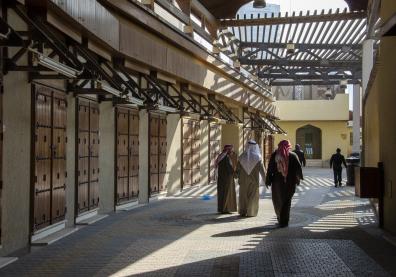Cities and circulations: Challenging theorical frameworks in Gulf Studies and geographies

Résumé de la manifestation scientifique
The conference revisits historical processes of knowledge production, immigration, andcultural exchange in colonial and post-colonial geographies of the Gulf. It also uncovershistories of community, migration, language/dialect, and hinterland denials in both themaking of Gulf cities and the production of their histories. The aim is to foster novelinvestigations that question the positionality of different actors, that humanise thelandscape, and that deconstruct persistent myths, material and immaterial structures,spaces and systems that limit a critical reading on the Gulf.
Programme
Mercredi 29 mai 2024 - Maison de la Recherche, 2 rue de Lille, 75007
8h30 : Registration - Welcome Coffee
9h : Institutional welcome remarks. Inalco, KU, CEFREPA, Sciences Po
10h : Session 1: Moderated by Hélène Thiollet, Sciences Po-Ceri
Challenging persitent dichotomies in historical processes : resituating Gulf histories within complex phenomena of hybridisation through South-South circulations
10h : Todd Reisz, Independant Scholar
- Infinite Arrivals
10h30 : Mae Al-Ansari, Kuwait University (zoom)
- Challenging dichotomies in Gulf histories: refraiming tradition, housing, and architectural flows as critical aspects of recentering
11h : Talal Al-Rashoud, Kuwait University, &Wafa Al-Sayed, University for Science and Technolohy (zoom)
- Arabia's anti-colonial hub: Kuwait and the Bahrani nationalist movement (1956-1966)
11h30 : Q&A
12h30 : lunch break
14h : Session 2: Moderated by Eric Verdeil
Recentring Gulf cities within colonial- and post-colonial histories and uncovering the webs of connections, transfers and conflicts within And Across empires
14h : Philippe Pétriat, Paris 1 Panthéon-Sorbonne University
- The (first) Line: Tapline's cities and the historiography of oil urbanism in the Gulf
Abstract: "Between 1948 and 1950, the world's largest oil pipeline was built by Aramco's shareholding companies to connect the fields in eastern Saudi Arabia with an oil terminal at Sidon. This 1,200 km-long line across the desert was not only used to ship oil to the Mediterranean. It has been the axis of a new urbanization in the Saudi kingdom as well. The specific challenges of the regions crossed by the pipeline led the Tapline company to apply a policy that was both close to and distinct from oil urbanism followed in Ahsa, which a recent and quite critical historiography has highlighted. I propose to explain these cross-fertilizations between urban planning models and the traffic patterns for which the Tapline has become a structuring regional axis. »
14h30 : Lukasz Stanek, University of Michigan, Ann Arbor
- Mobilities of weak actors
15h : Alix Philippon, Sciences Po, Aix-en-Provence
Redefining Baghdad trhough the shrines: translocal devotion, mobilities and urban politics in post-2003 Iraq
15h30 : Q&A
16h : keynote
Mohammad Al Jassar, Secretary general for the National Council for Culture Arts and Literature, Kuwait
- The past, present, and future of two marginalized towns in Kuwait
18h30 : cocktail Inalco aux salon Borel et de Tassy (1er étage)
Jeudi 30 mai 2024 - Sciences Po - 1 place Saint Thomas, Bâtiment B
(Sur inscription)
9h : Welcome coffee
9h30 : Session 3: Moderated by Chantal Verdeil, Inalco-CERMOM
Representing cities, circulations and transformations through languages and literature
9h30 : Marcela Rubino, Inalco-CERMOM
- The treatment of race in post-2000s Gulf novels
10h : Elisabeth Vauthier, Université Jean Moulin-Lyon 3 IETT - CEFREPA
- The City in Contemporary Novel : a Reading of the History of Kuwait
Abstract: The communication will address two contemporary novels: فئران أمي حصة (Mice of Umm Hessa, 2016) by Saoud al-Sanoussi and لا تقصص رؤياك (Don’t tell your nightmares, 2014) by Abd al-Wahhab al-Hammadi, that look back on the history of Kuwait and the violence it has experienced in recent years, to give a picture of the tensions in Kuwaiti political life. The analysis of these two works will show the way the novels represent urban space, in its material and symbolic dimensions, to draw the map of a country undermined by social tensions and political dissensions, foreshadowing – especially in Saoud al-San'oussi’s novel – a painful future.
Bio: Elisabeth VAUTHIER is a Professor of Arabic literature at the University Jean Moulin (Lyon 3). She is a member of the Institute of Transtextual and Transcultural Studies (IETT) and an associate member of the French Research Center of the Arabian Peninsula (CEFREPA). She conducts research on modern and contemporary Arabic literature, and in particular on the novel whose evolutions she studies. Researcher in delegation at CEFREPA in Abu Dhabi between 2021 and 2023, she led a project on “Tensions, dynamics and aesthetic configurations in the novel of the Arabian Peninsula” and has coordinated “The poetics of the fictional place in the novel of the Arabian Peninsula”, LiCarC, n° 3, Paris, Garnier, 2023) and The Contemporary Novel in the Arabian Peninsula, (forthcoming).
10h30 : Laura Hindelang, University of Bern
- Challenging cultural circulation: a media-historical approach to Gulf cities
11h : coffee break
11h30 : Q&A
12h15 : lunch break
14h : Session 4: Moderated by Asseel Al Ragam, Kuwait University
Revisiting and relocating Gulf architecture and urban planning within global, regional, and local contexts to draw Out continuities and exceptions beyond oil development
14h : Laurent Bonnefoy, Sciences Po-Ceri
- The Omani urban counter-model in the Gulf
14h30 : Anahi Alviso, Sciences Po-CEFREPA
- Un-Monuments across cities of the Arabian peninsula
15h : Jawaher Al Sudairy (zoom)
- Tracing the endogenous forces animating Makkah's urban restructuring
15h30 : Q&A
16h : Concluding remarks
Roundtable discussion